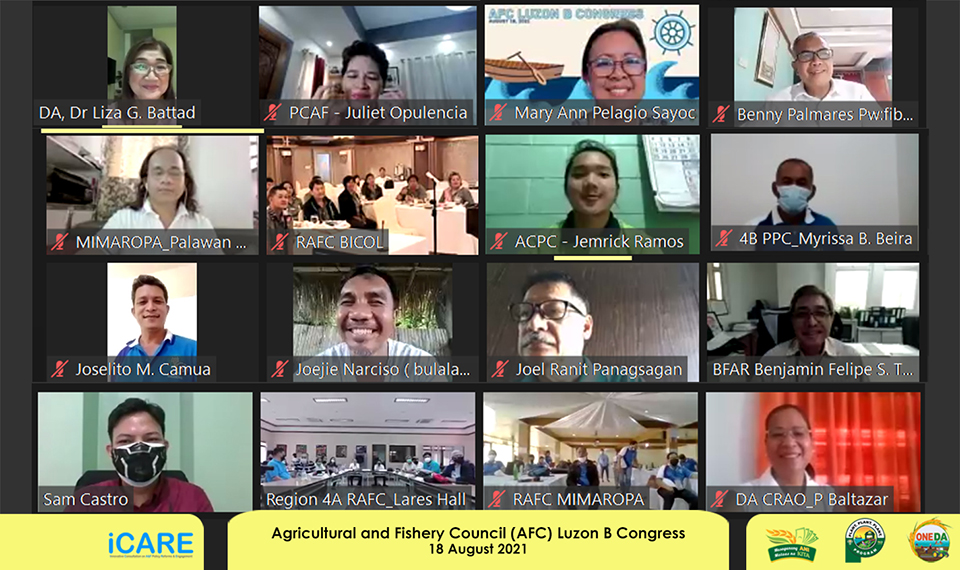
With the rising losses in agriculture and fisheries production due to climate change and the African Swine Fever (ASF), the Philippine Council for Agriculture and Fisheries (PCAF) held the Agricultural and Fishery Council (AFC) Luzon B Congress on August 18, 2021.
Luzon B is composed of CALABARZON (Cavite, Laguna, Batangas, Rizal, and Quezon), MIMAROPA (Occidental Mindoro, Oriental Mindoro, Marinduque, Romblon, and Palawan), and Bicol Region (Albay, Camarines Sur, Camarines Norte, and Sorsogon; two island provinces of Catanduanes and Masbate).
The combined face-to-face and virtual activity aimed to facilitate the exchange of relevant ideas to address issues facing the agriculture and fisheries sector, through the help of the AFCs as:
- Advocates in promoting sustainable initiatives toward more inclusive Food Security;
- Fulcrums that exert affirmative influence in the transition to Province-led Agriculture and Fisheries Extension Systems (PAFES); and
- Catalysts toward successful engagement of volunteer partners along with value chain linkages.
During the Congress, the Department of Agriculture-Climate Resilient Agriculture Office (DA-CRAO) reported a cumulative 291-billion agri-fishery production loss from 2010 to 2019 due to natural and climate-related hazards such as earthquakes, volcanic activities, typhoons, floods and moisture stress.
The Adaptation and Mitigation Initiative in Agriculture (AMIA) intends to reverse these hazard effects and losses by enabling local communities to manage climate risks while pursuing sustainable livelihoods.
Currently, there are 115 AMIA villages nationwide that serve as testing grounds for adaptation and mitigation actions and as platforms for innovation and partnerships.
Another issue discussed during the assembly was the ASF. Updates on South Luzon statistics were presented as well as specific initiatives under the Bantay ASF sa Barangay (BABay ASF) Program.
BABay ASF key function areas include local government unit engagement, surveillance, biosecurity, capability and awareness, and recovery and repopulation.
With regards to regional ASF status, the Bureau of Animal Industry announced that MIMAROPA is still an ASF-free zone.
Also included in the Congress’s agenda was the discussion of PCAF Policy Service Ambassadorship System (PSAS) and the Mandanas-Garcia Ruling and its implications to the national government and functions of the AFCs.
After the presentations, breakout sessions were organized to come up with relevant recommendations regarding the issues deliberated.
Some of the proposed resolutions included:
- Increase funds for AMIA villages to cover all regions
- Include the adoption of BABAy ASF Program as one of the criteria in the Seal of Good Local Governance
- LGUs issue executive orders and ordinances in support of the BABAy ASF Program, specifically for border control and monitoring system and unhampered movement of animals
- Prioritize hiring of agriculture graduates in LGUs
- Establish food processing plants in fruit and vegetable production areas and drying facilities in big palay-producing municipalities that are accessible to farmers
- Support digital platform for online marketing of organic products
- Include coconut production and technology modules in TESDA agriculture courses
- Provide insurance benefits to farmers (i.e Philhealth, SSS, etc.) and COVID-19 insurance for AFCs
The Visayas Congress, to be participated by Region 6, 7 and 8, was tentatively scheduled on September 7 while the Mindanao Congress, to be participated by Region 9, 10, 11, 12, 13 and BARMM, was targeted in November.
As the Philippines journey towards a One Resilient Agriculture, PCAF and DA acknowledge the importance of AFCs in the planning, implementation and monitoring of government programs that address issues and improve the agriculture and fisheries sector. | JCL











